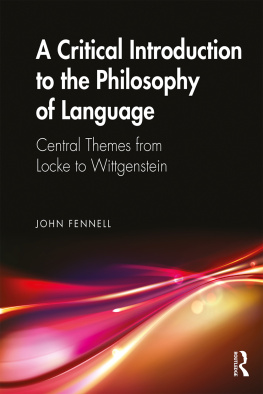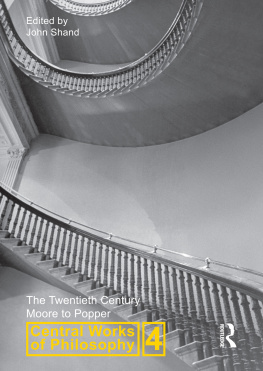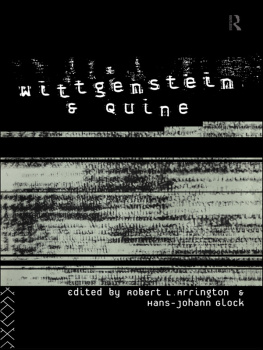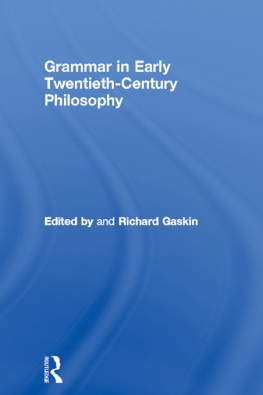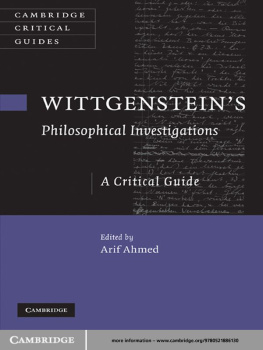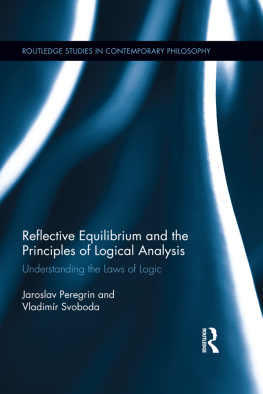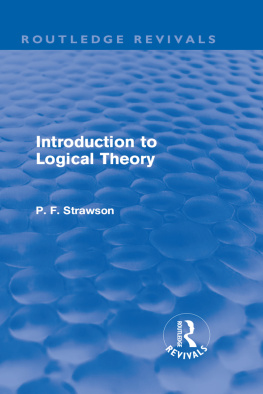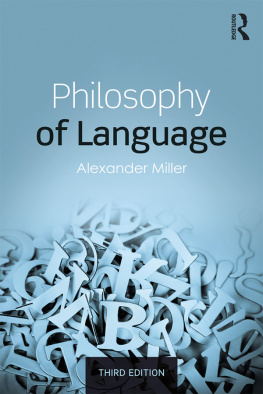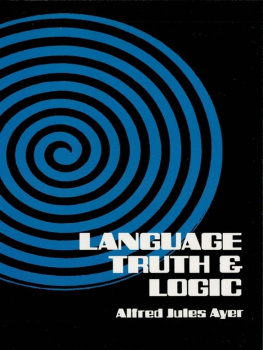A Critical Introduction to the Philosophy of Language
A Critical Introduction to Philosophy of Language is a historically oriented introduction to the central themes in philosophy of language. Its narrative arc covers Lockes idea theory, Mills empiricist account of math and logic, Frege and Russells development of modern logic and its subsequent deployment in their pioneering program of logical analysis, Ayer and Carnaps logical positivism, Quines critique of logical positivism and elaboration of a naturalist-behaviorist approach to meaning, and later-Wittgensteins ordinary language philosophy-inspired rejection of the project of logical analysis. Thus, it historically situates the two central programs in early twentieth-century English-speaking philosophy logical analysis and logical positivism and discusses the central critiques they face later in the century in the works of Quine and the later-Wittgenstein. Unlike other secondary studies in philosophy of language, A Critical Introduction to Philosophy of Language is not just a greatest hits album, i.e., a discontinuous compilation in which classics in the field are presented together with their standard criticisms one after the other. Instead, Fennell develops a particular, historical-thematic narrative in which the figures and ideas he treats are introduced in highly intentional ways, and by cross-referencing them throughout his discussions, he highlights the contributions they make to the narrative they comprise.
John Fennell is Associate Professor of Philosophy at Grinnell College in Grinnell, Iowa.
In memory of my father
A Critical Introduction to the Philosophy of Language
Central Themes from Locke to Wittgenstein
John Fennell

First published 2019
by Routledge
52 Vanderbilt Avenue, New York, NY 10017
and by Routledge
2 Park Square, Milton Park, Abingdon, Oxon, OX14 4RN
Routledge is an imprint of the Taylor & Francis Group, an informa business
2019 Taylor & Francis
The right of John Fennell to be identified as author of this work has been asserted by him in accordance with sections 77 and 78 of the Copyright, Designs and Patents Act 1988.
All rights reserved. No part of this book may be reprinted or reproduced or utilised in any form or by any electronic, mechanical, or other means, now known or hereafter invented, including photocopying and recording, or in any information storage or retrieval system, without permission in writing from the publishers.
Trademark notice : Product or corporate names may be trademarks or registered trademarks, and are used only for identification and explanation without intent to infringe.
Library of Congress Cataloging-in-Publication Data
Names: Fennell, John (Associate Professor of Philosophy), author.
Title: A critical introduction to philosophy of language: central themes from Locke to Wittgenstein / by John Fennell.
Description: New York: Routledge, 2019. | Includes bibliographical references and index. |
Identifiers: LCCN 2018048097 (print) | LCCN 2018049537 (ebook) | ISBN 9780429026553 (ebk) | ISBN 9781138339712 (hbk: alk. paper) | ISBN 9781138339729 (pbk: alk. paper)
Subjects: LCSH: Language and languagesPhilosophy.
Classification: LCC P107 (ebook) | LCC P107 .F45 2019 (print) | DDC 401dc23
LC record available at https://lccn.loc.gov/2018048097
ISBN: 978-1-138-33971-2 (hbk)
ISBN: 978-1-138-33972-9 (pbk)
ISBN: 978-0-429-02655-3 (ebk)
Typeset in Bembo
by Deanta Global Publishing Services, Chennai, India
Contents
This book is the fruit of sixteen years teaching a philosophy of language survey class to my very dedicated students at Grinnell. Consequently, most of my important interlocutors have been students, who over the years in class, in office hours, and in their papers, asked many probing questions and offered numerous telling insights. What follows is an undoubtedly incomplete, alphabetical list of those students whose contributions I have profited from (my sincere apologies to anyone Ive inadvertently overlooked): Will Boney, Dana Bricken, Ronan Brooks, Silvio Curtis, Karan Dhingra, Nick Fitz, Will Flagle, Sam Gault, Serge Gianchetti, Elijah Giuliano, Paul Grant, Derek Gumm, Chris Hellmann, Emma Jerndal, Ben Johannsen, Drew Johnson, Patrick Laine, Ben Leider, Holly Lutwitze, Brendan Mackie, Sarah Marcum, Brian Marion, Dan Miles, Ilan Moscovitz, Norman Perlmutter, Cat Pierro, Stephen Rimi, Eric Ritter, Conor Robetorye, Mark Schwabacher, Kim Spasaro, Lauren Teixeira, Emily Tulman, Dave Ventresca, Connie Wang, and Ariel Wolter. I presented versions of parts of several chapters to various audiences, and benefitted from the constructive feedback of, in particular: Cathy Legg, Johanna Meehan, Joe Neisser, and Alan Schrift. I offer special thanks to Jen Dobe whose valuable comments on several of the early chapters led to improvements, and to Angie VanderLeest whose technical skills were responsible for the diagrams that appear in Chapter Three. Those who have influenced me in more formative ways both in discussion and through their own writings and example include: Tom McCarthy, Marion Tapper, Barry Taylor (dec.), Meredith Williams, and Michael Williams. Many thanks to John Grennan for his excellent index, and the editorial team at Routledge for all their assistance.
My greatest gratitude goes to my wife, Simone, and my daughter, Penelope. Simones kindness and encouragement always restored me when I needed it most, and Penelopes joyful exuberance was the perfect antidote to writerly gloominess.
The basic question of epistemology, familiar from Descartes, is: how is knowledge of the world possible at all? How can I be sure that this representation of how things are that I am currently entertaining in my mind is true or accurate? May I not be dreaming or the victim of a delusion fabricated by an omnipotent deceiver? When we engage this question in epistemology, we direct our attention to the issue of evidential support (for this, after all, is what epistemology is concerned with). That is, we are interested in whether experience can provide evidence, justification, or reason to believe that this representation of the way the world is, is true or accurate. But to even ask this question, we already presuppose that beliefs can be about , or hookup with, the world, that language or beliefs can represent the world in some way or other, in the first place. For, it is only if they can represent the world in some way or other that we can then ask whether the representation is accurate or not. Thus, there is a prior question about the representational capacity of beliefs, thoughts, and utterances how can they be about the world at all? This question introduces fundamental issues in meaning, representation, reference, and truth which are the focus of twentieth-century analytic philosophy.
Twentieth-century analytic philosophy has a large concern with language for it is concerned with these questions of representation and meaning, and its methodological assumption is that in order to work out how something can represent something else, it is best to investigate the medium in which this representation takes place. There are two likely candidates for being the media of investigation: mind and language. Minds and their mental states are fugitive things, though; traditionally thought to be non-physical, subjective, and private in nature. Thus, the move to investigate the nature of representation by investigating language which inaugurated the linguistic turn that analytic philosophy took in the twentieth century. I begin by trying to understand the need for this turn by looking at the problems that beset the alternative approach to meaning and representation that takes private mental states as the object of investigation, which was the approach adopted by the early moderns. Thus, to appreciate the innovations of the linguistic turn I set it against the Early-Modern approach which was, more or less, the approach taken by the tradition from the seventeenth century up to when the linguistic turn took hold. Locke was a prime example of the Early-Modern approach; hence I refer to it as the classical empiricist conception of meaning, but it was common to the early moderns generally. Isolating the central features of this account and the problems it results in, which motivate the linguistic turn, is the concern of Chapter 1.

